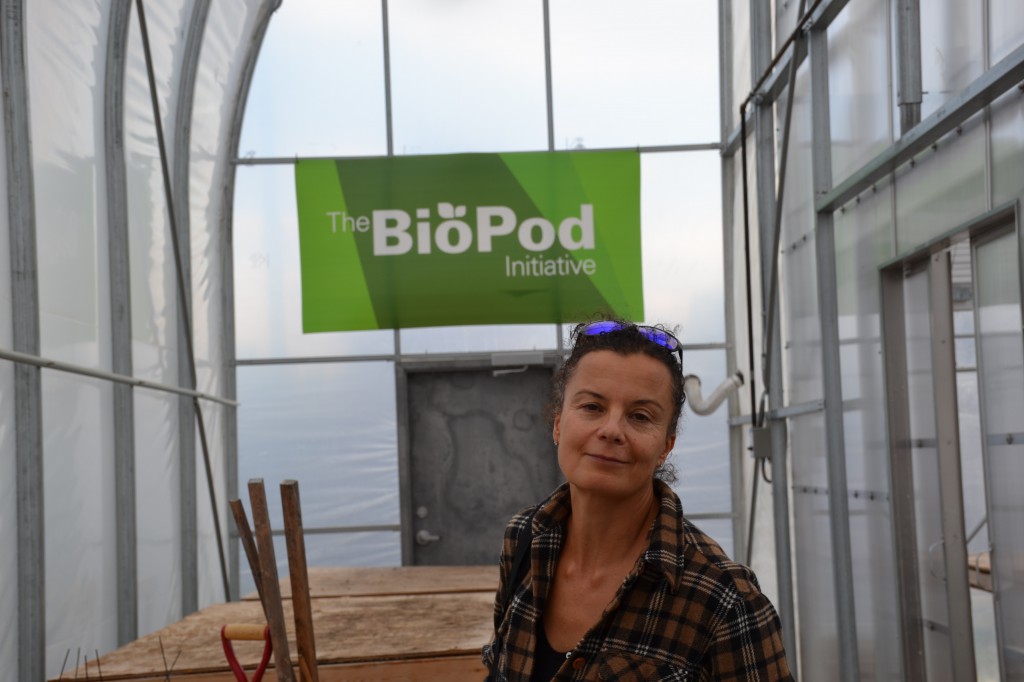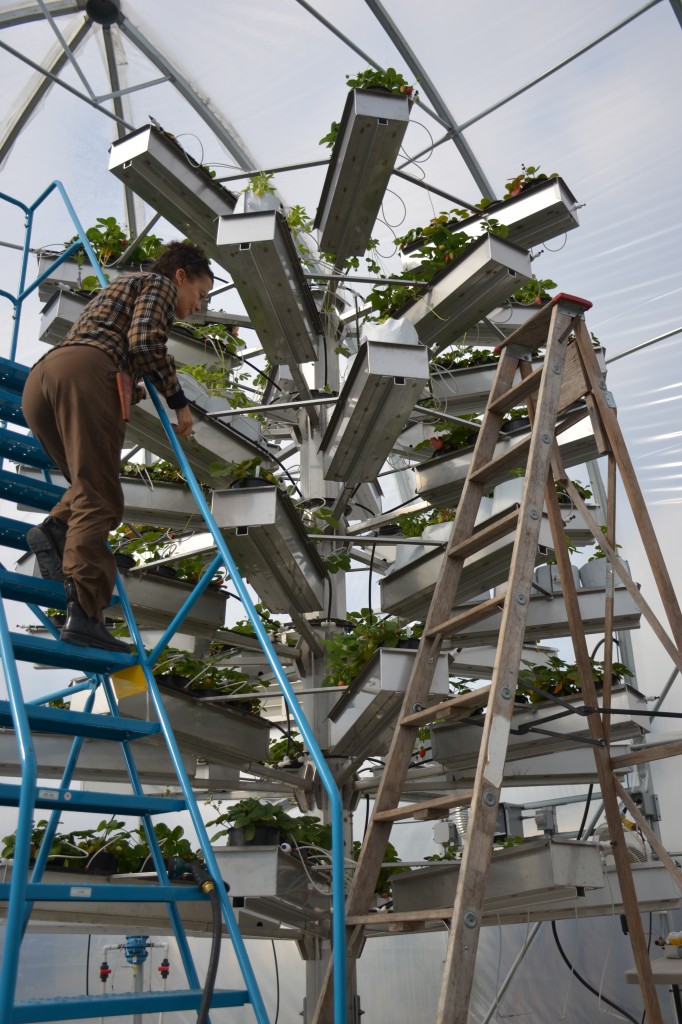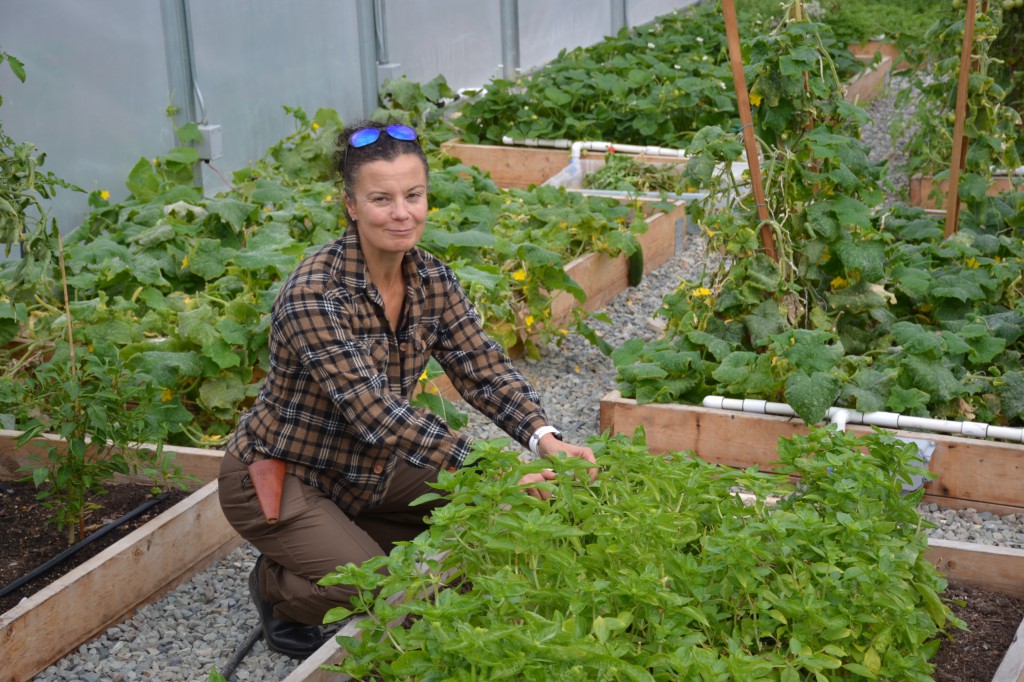By Ronda Payne
Slightly west of King George Highway in Surrey is hardly the place one would expect to find food growing, but the BioPods at John Volken Academy aren’t exactly your typical growing space. Laila Benkrima, a contract horticulture instructor and scientist with the University of the Fraser Valley (UFV), is part of the team that brought the greenhouse structures together in 2016. It’s a cooperative project between the academy, UFV and the City of Surrey.

“We built this thing called a BioPod with a grant from Investment Agriculture Foundation through the Growing Forward 2 program,” says Benkrima. “The greenhouses were built by BW Global. They built us a new prototype. The goal was to test a new cladding material.”
The two BioPods are side by side with a shared vestibule or “head house” as Benkrima calls it, as the entry point to both. The southern BioPod is made with regular poly, while the northern one has a special light-diffusing poly.
“That was the research project,” she says. “We grew the same crops in both BioPods and checked the yield.”
The outcome was a 10 per cent average increase in yield in the light-diffusing poly. Some crops had up to a 20 per cent increase in yield compared to the regular poly greenhouse. This is the primary objective of the BioPod project through UFV, to test out new agricultural technologies and provide research findings to the companies seeking information on their products.
“We are doing research for other companies,” Benkrima explains. “We did some research on production of leafy greens, on testing LED lighting, and organic wasabi in the raised beds for two years.”
Many of those companies are start-ups with limited funds, so the BioPods can help with testing, creating a report and building awareness to help companies grow.
“We are a resource for the industry, but because we are urban, it’s more of the technology,” she explains. “We grow vegetables year round. It’s an Argus-controlled system.”

The BioPods also house growing towers, known as Eco Spirit Towers, from Affinor Growers. Benkrima has grown strawberries, basil and other crops in organic soil in the towers and has both an early model and an updated version as Affinor continues to enhance the tower’s development.“We’re always bringing in small and bigger projects,” she says.
“The students are always helping me record the data. They actually want to work in the greenhouse. Two went into greenhouse jobs.”
These students are where the John Volken Academy gets involved. The academy is a two-year addiction treatment facility where participants stay and learn life skills. As Benkrima explains, these individuals made the BioPods come to life under the poly covers.
“They did everything,” she says of the students. “They built benches, dug beds, built beds, brought in the soil. This is urban Surrey, there was no soil here. We had to dig beds, bring in organic soil.”
The students also brought in the gravel to go around the beds and built the irrigation system as well as planting the crops. Now that the building is completed, Benkrima works with two or three students at a time, based on their interests and how far along they are in the academy’s program.
“They need to get to one year in the program, and then they can work here,” she says. “Maybe two or three hours a day. They live on site. They live and cook there.”
Because they live in the academy across the lane from the BioPods, students are able to harvest vegetables, cook and eat them. Benkrima asks what they want to plant and, although the students can be shy at first, they begin to open up about the kinds of food they like.
“We have basil, so they’re making tons of pesto,” she says. “We just talk about it. What do you like to grow? One says, ‘I love Mexican food.’ So let’s look at the seed catalogue. I try to get them to talk. I like the teaching. I have interest in horticulture therapy—it’s my passion.”
Sometimes the students want to grow beets because they like borscht. Other times it’s about designer vegetables. Growing consistently in the BioPods are tomatoes, strawberries, cucumbers, peppers, herbs, lettuce, wasabi, kale, spinach and beets.
Benkrima’s ex-partner was substance-addicted, so she has a better understanding of the disease of addiction than many others.
“If I can help a little bit with what I love, I can’t say no,” she explains.
The students have their own projects and Benkrima finds they take it very seriously, making notes, journaling and creating a sense of belonging. She also finds there are teachable moments in the BioPods and she prefers a loose structure that allows for conversation to happen naturally.
Just like the soil, everything in the BioPods is organic. Benkrima works with entomologists and other scientists to get ahead of things, but finds her biggest problem is still pests. She’s dealing with thrips now.
“The pest management is always the challenge,” she says. “We never lose a crop, but it’s never perfect. But we’ve had some really great crops.”
The Surrey-based BioPods are a source for innovation, testing and growing—both of plants, and humans. By having a collaboration between partners, more is possible in this urban setting than many would have expected.













